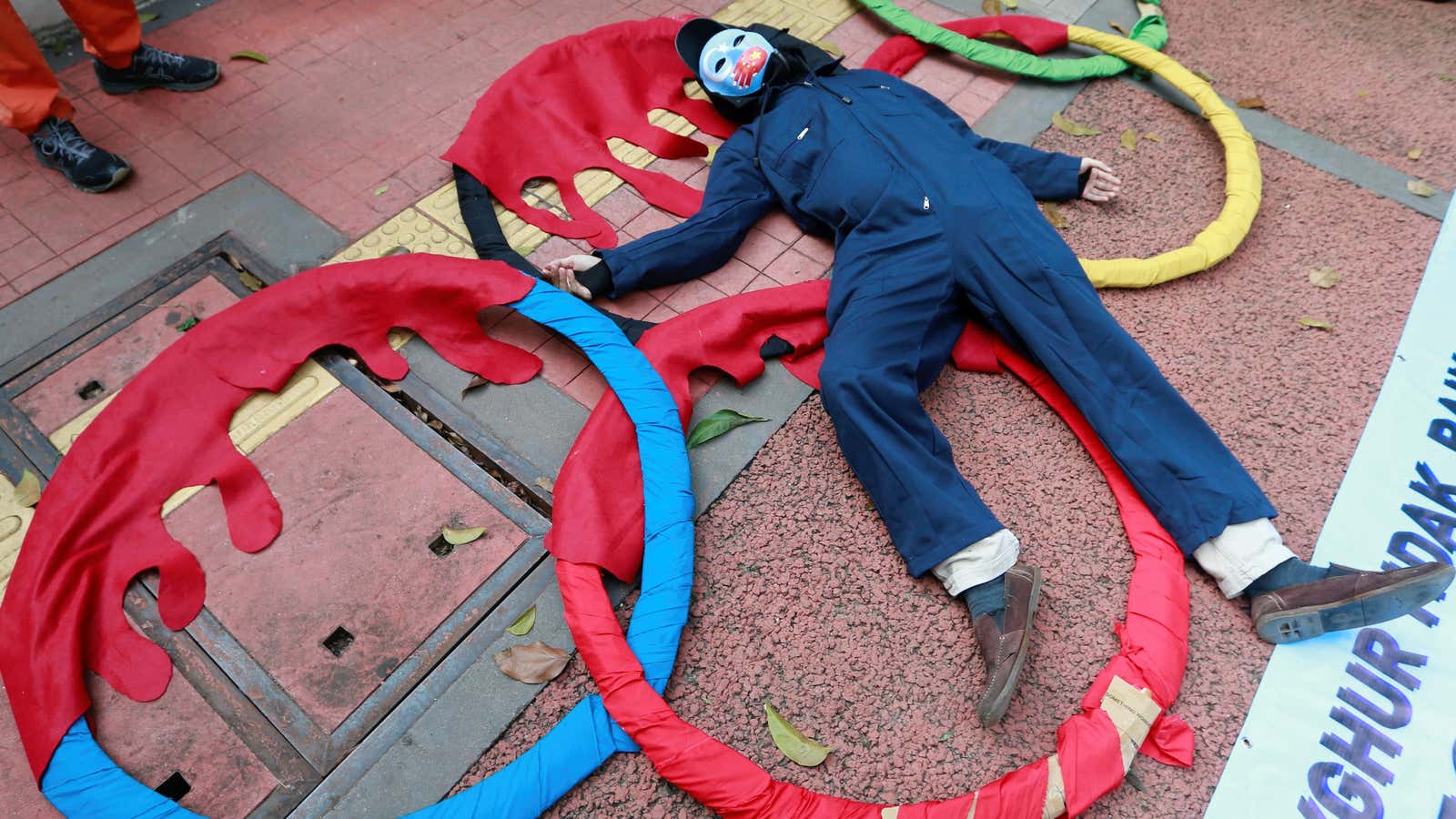Hi Olympic fans!
It’s Olympics time, again! Hot (or should we say, cold) on the heels of the Tokyo Summer Games, Beijing 2022 is here with something to prove. Two things, actually—China is hoping to show that its zero-covid policy will result in a safe environment, and that it can pull off a triumphant Olympics despite the world’s reaction to its human rights record in Xinjiang and Hong Kong. It’s safe to say the Beijing Winter Olympics is going to be even weirder than Tokyo’s.
2008 vs. 2022
Back in August 2008, the world was excited about the China that was hosting the Summer Olympics, and sympathetic to the massive loss of human life due to a recent Sichuan province earthquake. Dignitaries from rich and poor countries showed up, including George W. Bush, the first sitting US president to attend an Olympics overseas.
A day before arriving in Beijing, Bush declared in a speech in Thailand: “Change in China will arrive on its own terms… yet it will arrive.” Fourteen years later, a very different country is hosting the Winter Olympics. China is far richer and older than it was in 2008, but the political liberalization that many countries had hoped for never arrived.
Here are five figures on China that look a little different now:
🤑 Per capita income: $3,468 in 2008 vs. $12,551 in 2022
👀 Share of Americans viewing China unfavorably: 42% in 2008 vs. 76% in 2022
🍼 Annual births: 16 million in 2008 vs. 10.6 million in 2021
🇨🇳 Participants in the opening ceremony: 15,000 in 2008 vs. 3,000 in 2022
🥇 Gold medals won: 48 in 2008 vs. TBD this year
What good is a boycott?
In December, several countries, including the US, Belgium, Canada, and the UK, announced they would not be sending official delegations to the Winter Olympics. Has the gesture had any impact?
China has spent the last decade deepening its repression of its Uyghur minority in Xinjiang—whose main crime is belonging to a different faith and ethnicity than China’s Han majority—into a campaign of mass forced detention. The crackdown on Hong Kong in the wake of 2019 pro-democracy protests has also soured sentiment toward Beijing. Arguably the last straw was the November disappearance of tennis star Peng Shuai after she made an allegation of sexual coercion against a former top Communist Party official.
But if history is any guide, Olympic boycotts don’t accomplish much. The US barred its athletes from competing in the 1980 Moscow Summer Olympics over the USSR’s invasion of Afghanistan, but the Soviet intervention dragged on for another nine years. Meanwhile, the diplomatic boycotts will be virtually unnoticeable against the backdrop of strict covid rules that have enveloped the Games in a bubble, from which some judges don’t expect to emerge until April.
Chinese state media has called the US boycott “despicable,” and accused countries of politicizing a venue for global friendship. “They can put on a performance, while we will hold the event ourselves,” read an opinion piece (link in Chinese) from the Beijing Daily.
Beijing very much needs the Games to strengthen Chinese citizens’ faith in its leadership after an exhausting two years of covid-zero restrictions. China won’t sell tickets to either the general Chinese public or foreign spectators. Instead, there will be carefully screened and quarantined groups, who will likely dutifully chant approved official slogans and look out for any protest-adjacent behavior from foreign participants.
And behind it all, the rows of empty seats will just reinforce the idea that China is resolute in the battle against covid—not that it’s on thin ice with the west.
How to watch the opening ceremonies
US-based viewers will be able to watch the festivities live on NBC, Peacock, the Olympic Channel, and the USA Network at 6:30am ET on Feb. 4. The event will be held at the National Stadium (also known as the Bird’s Nest) in Beijing.
US officials will also be watching closely. Weeks before the games, Republicans serving on the House Energy and Commerce Committee sent a letter to NBCUniversal voicing concerns about “the extent of influence the [Chinese Communist Party] may have over NBCUniversal’s coverage of the games.”
We’ll be back in your inbox at the end of the week to discuss opening ceremonies and a lot more. Want to get a fellow Olympic fan in on the action? Here’s where they need to go.
Get in touch with us at needtoknow@qz.com and live your best Quartz life by downloading our iOS app and becoming a member. Today’s email was brought to you by Jane Li, Tripti Lahiri, Adario Strange, Morgan Haefner, and Susan Howson.
